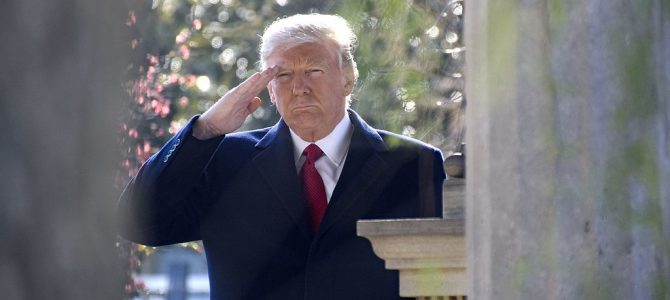
During the 2016 campaign, Donald Trump was an anomaly. Other than international trade and alliances, he didn’t appear to have any firm, ideological beliefs about any issue whatsoever. At times, he spoke like a conventional interventionist, one that would make Dick Cheney and Bill Kristol proud: on combatting the Islamic State, his “bomb the s*** out of ’em” sounded good, resolute, and tough.
On other occasions, however, Trump was far more circumspect and skeptical about the use of military force. He frequently referenced the invasion and occupation of Iraq during the campaign, and during numerous presidential debates, as the quintessential stupid decision by America’s calcified foreign policy establishment.
When several dozen senior GOP foreign policy veterans released a letter criticizing Trump’s acumen, smarts, and morality for the job, Trump shot back with a volley of his own, one that many Americans tired of long-term foreign engagements could appreciate.
“The names on this letter are the ones the American people should look to for answers on why the world is a mess,” Trump’s campaign wrote in a statement, “and we thank them for coming forward so everyone in this country knows who deserves the blame for making the world such a dangerous place.”
Why Critics On Left And Right Hated ‘America First’
Trump’s “America First” platform was anathema to many in this very same Washington establishment. Democratic and Republican heavyweights in the foreign policy universe perceive this America-centric, rather than globalist, view as a mistake of epic proportions.
Indeed, it was one belief that conventional Republicans and Democrats, from hyper-interventionist lawmakers to liberal internationalists, could agree on: withdraw America from the world stage, and watch the Russians and Chinese fill the void and press their advantage.
But what these critics completely failed to acknowledge or see is that “America First” wasn’t about retrenchment. At its most fundamental, it was about reorienting U.S. foreign policy away from a situation where the United States responded, primarily with our military, to every beck and call and to every minor sectarian skirmish by going face-first into the problem.
It was about not spending trillions of dollars in the Middle East with very little returns for the U.S. national security interest. It was about bringing some of that cash home, where it could be spent on paving the roads, fixing the highways, refurbishing the crumbling tunnels and bridges that Americans drive under and over every day, and providing veterans who served overseas for the last decade and a half with better medical care that they were receiving.
‘America First’ Primed Hard Questions We’ve Ignored
But mainly, it was a call to ask the very difficult questions that haven’t been asked since the 9/11 attacks. Is rebuilding nations from the ground up and transitioning countries from dictatorship to democracy within America’s reach? Should American soldiers from Kansas or Louisiana be dual-hatted police officers and civil engineers in Iraq and Afghanistan? And have the returns over the last 16 years in the Middle East been worth the sacrifice?
They were enormously difficult and uncomfortable questions to ask, forcing policymakers who may have supported the Iraq war to look in the mirror and reassess their assumptions and beliefs. But the questions needed to be asked because they haven’t been acknowledged over the last decade.
And yet, during his first months as president, Trump has made decisions that appear to move him away from the doctrine of realism he campaigned on so vigorously.
The Trump Of 2016 Isn’t the Trump We’re Seeing Now
The Trump administration is a lot closer to conventional foreign policy orthodoxy than many of his political enemies thought or his supporters desired. It’s easy to look at the last several weeks—Tomahawk missiles destroying several of the Assad regime’s aircraft, the U.S.S. Vinson streaming towards the Korean Peninsula—and to conclude that President Trump is leaving “America First” behind.
Polls show only 47 percent of white Americans without a college degree (Trump’s core constituency) approve of the way he is handling foreign policy. But those numbers could just as quickly change, given that we are in the very early stages of Trump’s presidency.
President Trump will have a lot of decisions to make over the weeks, months, and years ahead. Like many presidents, there is very likely to be a major national security crisis on his watch. The deliberations in the National Security Council will be exhausting, exhilarating, and probably frustrating.
But throughout, Trump shouldn’t ignore the outlook that helped get him elected: no long-term U.S. commitments unless it is absolutely necessary to preserve the country’s interest. And throughout it all, he can be confident that the 69 percent of Americans who believe that the U.S. national interest should be the first priority will be with him.








